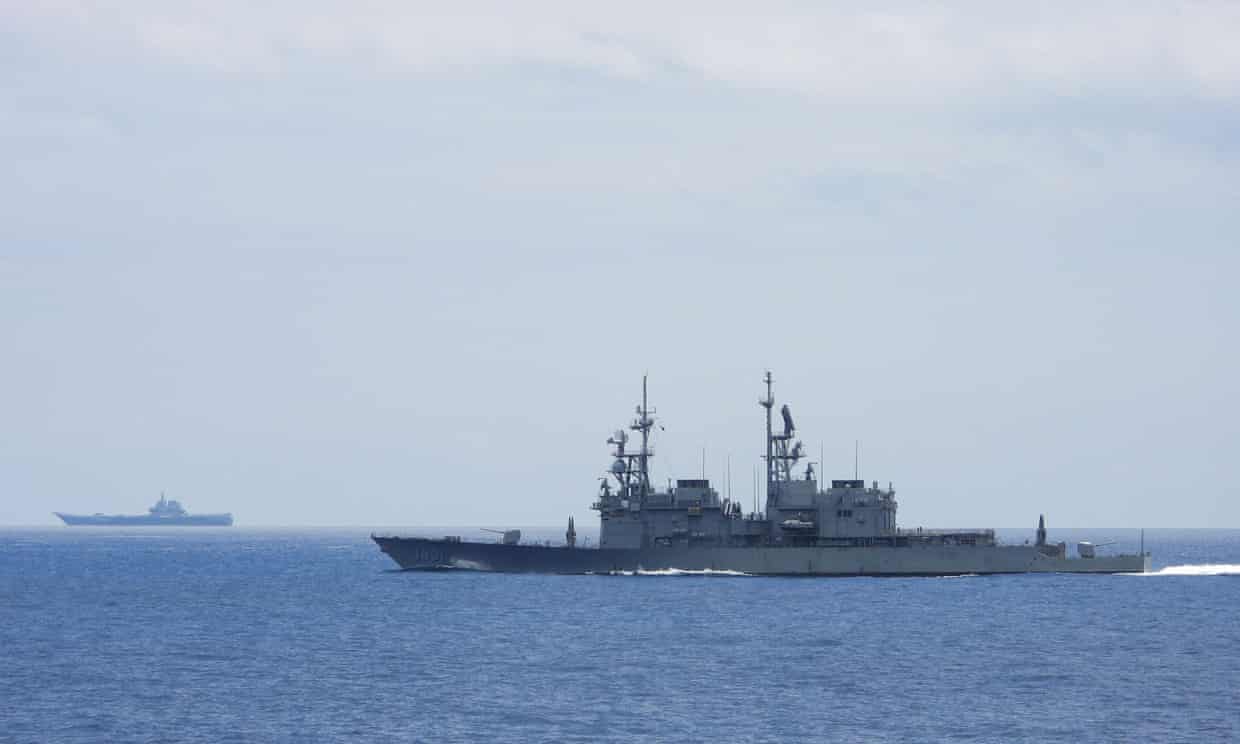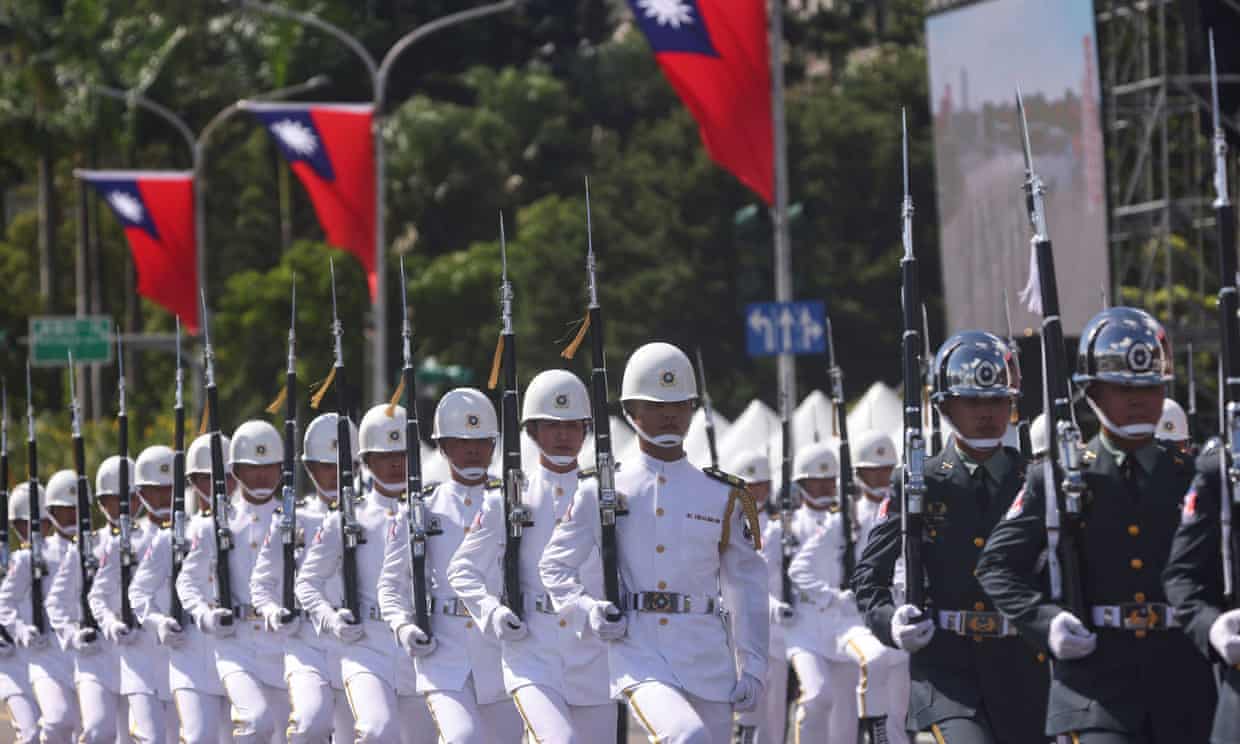As Beijing has increased its efforts to recruit Taiwanese people, the number of spying cases has risen
In November, a Taiwan court heard accusations that two serving soldiers had accepted bribes from Chinese agents to record a video declaring their loyalty to China and their intention to defect in the event of a war. The video reportedly made its way into Chinese propaganda materials.
Weeks later, a conviction over a similar accusation was upheld against a retired army colonel. The colonel was found guilty of having accepted monthly payments totalling more than half a million Taiwan dollars (£12,500) to delay his retirement for years and serve as a spy. Local media reports said the colonel also posed for a photo holding a handwritten note, pledging his loyalty to Beijing’s cause of annexing Taiwan to the Chinese state.
“I, Hsiang Te-en, hereby pledge to support cross-strait peaceful unification,” the note read. “I will do my best at my current post to fulfil the glorious task of pushing for peaceful unification for the motherland.”
The cases are among dozens of espionage allegations tried in recent years that involve serving or retired soldiers in Taiwan accused of spying for China.
Tensions between China (formally the People’s Republic of China, or PRC) and Taiwan (formally the Republic of China, or ROC), are at their highest in decades. The ruling Chinese Communist party (CCP) claims Taiwan is a province of China, and its leader, Xi Jinping, appears to have made “reunification” a crucial component of his future legacy. The CCP has never ruled Taiwan. The party took control of the mainland after the civil war in 1949, ousting the nationalist government led by the Kuomintang (KMT), which fled to Taiwan and established a government in exile. But the CCP bases its claim on historical ties between the two regions, including during the Qing dynasty. Taiwan’s leaders say it is a sovereign state and its future is for the people to decide.
Under Xi’s rule the PRC has ramped up intimidatory and coercive actions against Taiwan, with the aim of eventual annexation. It runs extensive grey-zone military activities, cyber, economic and cognitive warfare. Beneath all that is an apparently extensive and well-resourced network of spies and agents of influence seeking to steal secrets, gather intelligence, sow discord and undermine Taiwan’s democracy from within.
In 2017 Taiwan’s government estimated there were more than 5,000 spies working for China in Taiwan.
Taiwan’s defence minister, Chiu Kuo-cheng, said the Beijing intelligence service’s attempts to recruit Taiwanese people had been “considerable”.
“China does a lot of things to win our people over,” he said in December. “They’ve had a significant impact.”
Some cases involve a Chinese national posing as a businessman, but who has connections to CCP organisations known to conduct foreign espionage and influence work. Lavish dinner invitations and small gifts escalate to overseas trips, financial payments and sexual incentives that are then sometimes used as blackmail against targets.
In another high-profile case retired senior Taiwan military officials were convicted of charges related to the recruitment of others for a Chinese national, Xie Xizhang, who allegedly cultivated a network of agents and assets for Chinese intelligence services for decades while undercover as a Hong Kong businessman. Xie is wanted by authorities but is believed to be overseas.
Targeted nationals in Taiwan are not all military personnel – other cases have involved politicians and community leaders being offered free trips to China and other inducements before elections, or members of the Mongolian and Tibetan communities in Taiwan being recruited to give information on individuals to the CCP. Spies have even been found working in the president’s protection detail. But the sheer number of current and former soldiers being prosecuted has raised serious concerns about a cohort of people who arguably should be the most loyal to Taiwan.
Dr Shen Ming Shih, a research fellow at the Taiwan government-linked thinktank the Institute for National Defense and Security Research, says there are several factors driving recruitment. Some are ideological and linked to the complicated history of Taiwan and China.
“Because of Chinese sentiment, they do not think China is an enemy country, and their concept of hostility is weak,” Shen says. Others, he adds, are simply lured by money and sex, or driven by revenge over their treatment or lack of promotion during service. He says there has not always been enough understanding about the seriousness of what they are being recruited to do, along with lenient punishments in the past.
In about two-thirds of the cases involving military personnel, the accused are retired. But this trend appears to be changing, says Shen.
“The focus used to be on retired generals, but now it is gradually moving towards active-duty, middle-ranking officers, or junior noncommissioned officers and soldiers. The main purpose of this is to learn the combat capability and morale of the army, and to assess the grassroots officers’ and soldiers’ support for the ruling party.”
The temptation of high pay across the strait
Chen Xi is a 32-year-old Taiwanese who joined foreign fighters in Ukraine this year. Now back in Taiwan, he is lobbying for improved conditions and training in the ROC military. He told the Guardian morale was being affected by relentless cognitive warfare from China, and “outdated” leadership in the ROC military, which is historically rooted in the Kuomintang party (KMT). The KMT’s former leader, Chiang Kai-shek, who oversaw decades of brutal martial law in Taiwan, always intended to one day retake the mainland.
“A military that has lost its spiritual beliefs and honour will not have the concept of loyalty to the country and the people, and will naturally not be able to withstand the temptation of high pay across the strait,” Chen tells the Guardian.
He also suggested the complicated questions around Taiwanese identity had a specific impact on the military.
“For whom are they fighting? For what? For Taiwan? Or is it for the morality of the Republic of China? Why fight against China, a country of the same language and race?”

There is some sense among observers that the espionage cases were being promoted by government figures more than usual, in the run-up to Taiwan’s presidential election in January. The ruling Democratic Progressive party campaigned on its stance against Beijing’s aggression. But analysts also believe the high number of cases shows that authorities are catching up on the problem.
Defence journalist Tingting Liu says it is significant that the traditionally closed-off ROC military is cooperating with prosecutors and the government in rooting out spies.
“Usually it’s not easy for prosecutors or national security bureaus to go and directly investigate the military, but the three parties are now working very closely,” she says. “Yes there’s an increased number of people being caught, but that’s also because they’re upping their game.”
A spokesperson for the defence ministry said it was comprehensively strengthening defensive measures against the CCP’s “diverse means and methods of infiltration and intelligence gathering”. She said recent arrests stemmed mostly from internal reporting by other active service members. This highlighted “the effectiveness of persistent defence education and strengthening security vigilance”, she said.
The government has also hardened national security laws, increased regular questioning of crucial personnel, and toughened restrictions on retired officers visiting China. Observers said there had been a marked improvement in operational security and counterintelligence in recent years.
“There is no doubt that China is always trying various ways to damage Taiwan and look for any kind of intel that would benefit them,” says Liu. “But also Taiwan is trying very hard to arrest these people. It’s a race against time, and these cases being reported show that the threat is still real.”
Source: ‘A race against time’: Taiwan strives to root out China’s spies | Taiwan | The Guardian
